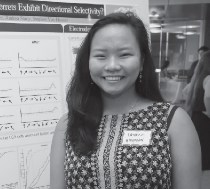Lauren Hayashi
 Van Hooser Laboratory
Van Hooser Laboratory
Department of Biology
Brandeis University
Do Lgn Cells in Developing Ferrets Exhibit Directional Selectivity?
Poster Abstract
During neural development, certain processes are dependent on sensory experience while others are innate. Development of directional selectivity in the primary visual cortex (V1) is an experience-based process, as selectivity is only exhibited post eye opening. The underlying mechanism of this development is yet unknown, and it is uncertain whether it is inherited from earlier points in the visual pathway, such as the lateral geniculate nucleus (LGN). We assess the LGN activity of visually naïve ferrets before and after presenting them with directional training stimuli in order to determine whether LGN neurons also gain directional selectivity from experience. As of now, data suggests that LGN cells are not tuned for orientation or direction.
Commercial 16-channel microwire brush-array electrodes are currently used to collect data, but work is being done to construct carbon fiber electrodes in-lab. This summer, we redesigned the 3D-printed jig that holds the electrode carbon fibers to a three-part model that provides ease when feeding fibers through and fire-polishing. Electrodes have not yet had satisfactory impedance measurements in all 16 channels, and our goal is to increase the number of successful channels before progressing to use in animals.
Personal Statement
This summer has gone by incredibly fast and I have gained so much through working in the Van Hooser lab. Though I officially joined the lab back in January, most of the experiences I had this summer were new, and I really got the chance to see what it would be like to work in a research lab full-time. I witnessed the bond between colleagues as I sat in on discussions about past, current, and future studies. In turn, I became much more comfortable around the other lab members and truly feel I could turn to them for support in my remaining time at Brandeis. This is especially true for my PI, and I have developed more confidence in approaching him for help or advice.
Over the past 10 weeks I was able to dedicate time to lab work in a way that is simply not possible during the school year, and I now have a whole new appreciation for the complexity and breadth of what we are studying. I found many opportunities to challenge myself: in thinking of ways to improve electrode construction, in taking on roles of responsibility during experiments, and in putting together a poster and presenting to fellow scientists and guests. I am so thankful to the M. R. Bauer Foundation for supporting me and my research this summer and allowing me to take full advantage of these opportunities.